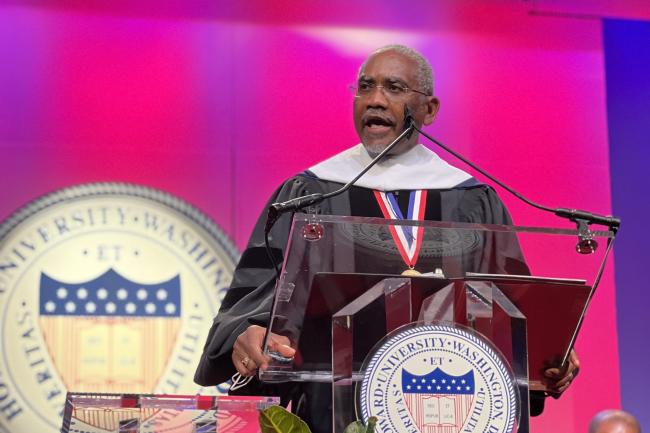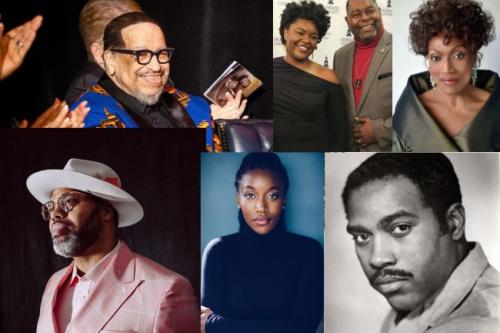WASHINGTON – U.S. Congressman and alumnus Gregory W. Meeks called on Howard University students to speak truth to power and confront distortions on a range of high-profile political and civic topics, including critical race theory.
“I call on the students of Howard University to be today’s friends of the truth and to leverage Howard’s powerful legacy as an inspiration in our fight to defend and promote the truth,” said Meeks, who served as orator of the 155th Charter Day Convocation ceremony.
To view the Charter Day Convocation address, visit here. Each year, the founding of Howard University is celebrated through the annual Charter Day Convocation and Charter Day Dinner. Traditionally a black-tie gala, this year’s virtual celebration will be a fundraising event with the proceeds supporting financial aid for Howard students. Find more information on the 2022 Charter Day Celebration.
Meeks, a Howard law alumnus, called the debates over critical race theory a “manufactured controversy” and an example of the truth being under concerted attack. He expressed outrage that opponents of critical race theory have complained about alumna Toni Morrison’s books being taught in schools.
“They’ve claimed that teaching about the racial realities of American slavery are too discomforting to teach children, and they’ve co-opted Civil Rights era rhetoric to promote a colorblindness lie that seeks to quell Black cultural affirmation,” Meeks said. Adding insult to injury, he added that many who objected to critical race theory also “were eerily silent when HBCUs recently experienced bomb threats.”
Meeks represents New York in the U.S. Congress and serves as chairman of the House Foreign Affairs Committee. Meeks is the first African American to hold the powerful position. Meeks touted the growth of Congressional Black Caucus, which has a record 59 members in the current Congress. He also applauded the high number of African American representatives who now chair major congressional committees, “which means we are setting the policy for the country.”
Meeks said Black federal lawmakers were working to ensure financial pandemic assistance to Black communities, debt forgiveness for farmers, the promotion of affordable housing and Black wealth, and diversifying corporate boards. Black leaders in Congress had delivered higher appropriations for HBCUs in recent federal budgets, and remained committed to pushing for more, he said.
In his Charter Day remarks, Howard University President Wayne A. I. Frederick also addressed the multiple bomb threats at HBCUs. He said the Black community has been no stranger to such threats – both real and fabricated.
“There are clearly those who want to slow down or put an end to what we do on our campus,”
Frederick said. “It is critical threat we do not allow these harassments to deflect us away from the purpose that has brought each of us to Howard University.”
Frederick continued, “Since our founding in 1867, Howard has always been a source for fear and a target of violence for those who wish to undermine the pursuit of justice and enshrine the unequal status quo in our society. We have never before enabled, and we will not now begin to allow tactics of intimidation to affect how we educate our students at Howard.”
Alumnus and chairman of the Board of Trustees Laurence C. Morse, Ph.D., called for continued unity within the Howard University community, in the face of “our share of challenges.” These included the Covid-19 pandemic, the spate of bomb threats, “vicious cyberattacks by unscrupulous modern-day pirates,” and “at times being at odds with one another within the bounds of our own campus.”
Morse said, “It is essential that we continue to fulfill the promise of Howard’s founders by continuing to provide educational opportunities to the many who cannot get such opportunities elsewhere. As we persist in carrying out the mission of our university, it is vital and essential that we strengthen the ties of community that bind us together.”
About Howard University
Founded in 1867, Howard University is a private, research university that is comprised of 14 schools and colleges. Students pursue more than 140 programs of study leading to undergraduate, graduate and professional degrees. The University operates with a commitment to Excellence in Truth and Service and has produced one Schwarzman Scholar, three Marshall Scholars, four Rhodes Scholars, 12 Truman Scholars, 25 Pickering Fellows and more than 165 Fulbright recipients. Howard also produces more on-campus African American Ph.D. recipients than any other university in the United States. For more information on Howard University, visit www.howard.edu.





